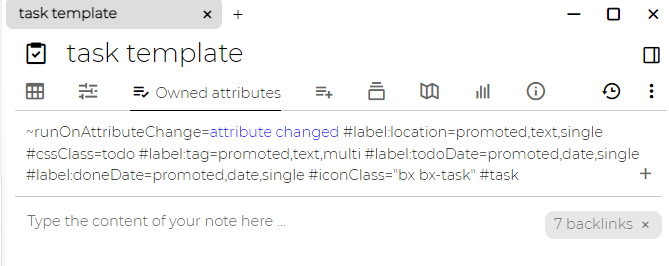-
-
Notifications
You must be signed in to change notification settings - Fork 1.9k
Attributes
Note attributes are key-value records owned by (assigned to) given note.
There are four types of attributes:
- Labels - simple key-value text record
- Relation - specifies named relation (link) to another note
- Label and relation definition - these are described in Promoted attributes page
Sometimes we're talking about labels and relations - keep in mind that both of them are types of attributes and are very similar.

Labels are used for several things:
- user can use them as labels with optional value - e.g. when catalogizing books, you might add labels like @year=1999, @genre=sci-fi, @author=Neal Stephenson
- attributes can be used to configure some advanced features / settings - see below
- plugins / scripts can use these to mark notes with some special values / metadata (e.g. note with imported reddit comment will have label with comment ID)
Labels can be used when searching.
Following labels are used for advanced configuration:
-
disableVersioning- disables auto-versioning. Useful for e.g. large, but unimportant notes - e.g. large JS libraries used for scripting -
calendarRoot- marks note which should be used as root for day notes. Only one should be marked as such. -
archived- notes with this label won't be visible in autocomplete-based search (jump to, add link). Applies also to all its sub-notes. -
excludeFromExport- notes (with their sub-tree) won't be included in any note export -
run- defines on which events script should run. Possible values are: -
frontendStartup- when Trilium frontend starts up (or is refreshed). -
backendStartup- when Trilium backend starts up -
hourly- run once an hour -
daily- run once a day -
disableInclusion- scripts with this label won't be included into parent script execution.
Relation is a kind of link between two notes.
This could be used when you e.g. keep a people database, you can use relations to keep formal links between people - e.g. note "Mike" will have relation "is husband of" note "Kate".
More importantly relations are used for some more advanced things - like attaching scripts to events happening on certain note.
-
runOnNoteView- attached script will be run whenever the note has been loaded -
runOnNoteTitleChange- attached script will be run whenever the note title has been changed -
runOnAttributeChange- attached script will be run whenever the note's attribute has been changed -
inheritAttributes- attached note's attributes will be inherited even without parent-child relationship
Attributes allow multiplicity - there can be multiple attributes with the same name. We're then calling such attributes "multivalue".
Every attribute has a flag called isInheritable. If this is true, then this attribute (key-value) is also applied to all its children notes, children's children notes etc.
Back to Overview
- Screenshot tour
- Basic concepts
- Installation & setup
- Advanced usage
- Developer guides
- FAQ
- Troubleshooting